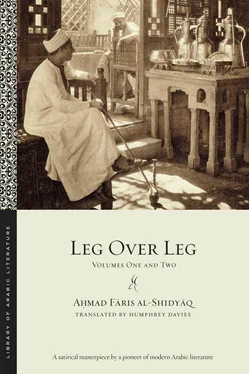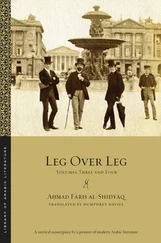or khazīrah ,
“something resembling ʿaṣīdah (‘a paste of flour and clarified butter’) with meat”
or ṣaḥīrah ,
“fresh milk that is boiled and onto which clarified butter is poured”
2.14.62
or ghadhīrah ,
“flour to which fresh milk is added and which is then heated with hot stones”
or furfūr ,
“mush made of thorny carob fruit”
or murrī ,
“pickles as condiments”
or maḍīrah ,
“broth cooked with sour milk”
or najīrah ,
“milk mixed with meal or clarified butter”
or waghīr ,
“boiled or cooked milk”
or khāmīz ,
“broth made of sikbāj (‘meat cooked in vinegar’)”
or khanīz ,
“ tharīdah (‘crumbled bread with broth’) made from flaky pastry”
or murazzaz ,
“food made with rice”
or basīsah ,
“milled curds pounded with clarified butter”
2.14.63
or ḥamīsah ,
“synonym of qaliyyah (‘broth made of camel meat’)”
or ḥays ,
“dates mixed with clarified butter or curds and then well kneaded”
or kasīs ,
“meat dried on stones and beaten when dry until it becomes like sawīq (‘parched barley meal’)”
or harīsah ,
[“a condiment made with chili peppers” or “a sweet confection made with flour, butter, and sugar”] “too well known to require definition”
or bawsh ,
“in Egypt, a dish of wheat and lentils washed together in a sieve, placed in a jar, sealed with mud, and put in a clay oven”
or jashīsh ,
“mush and finely milled wheat placed in a pot into which meat or dates are tossed and which is then cooked”
or rashrash ,
“the drippings from the grill”
or qamīshah ,
“a dish of milk and colocynth or similar seeds”
or mukarrashah ,
“a dish made of meat and fat wrapped in camel tripes”
or kawshān ,
“a dish of rice and fish”
2.14.64
or āmiṣ ,
“ āmiṣ , or amīṣ , is a dish made of calf meat with the skin, or sikbāj broth cooled and with the fat strained off”
or khabīṣ ,
“a dish of dates and clarified butter, also called barūk ”
or ʿamṣ ,
“a kind of food”
or karīṣ ,
“sorrel cooked in milk and then dried; eaten in hot weather”
or maṣūṣ ,
“a dish of meat cooked and marinated in vinegar, or especially of fowl meat”
or aqiṭ ,
“something made from buttermilk of sheep and goats”
or mubarqaṭ ,
“a dish into which a large amount of oil is worked”
or bahaṭṭ ,
“rice cooked with milk (an Arabized word)”
or khalīṭ ,
“kid, skinned and grilled”
or samīṭ ,
“kid, stripped of the hair and grilled”
2.14.65
or surayṭāʾ ,
“a soup, synonym ḥarīrah ”
or suwayṭāʾ ,
“a broth with a lot of water and trimmings, meaning onions, chickpeas, and grains of any kind”
or tashyīṭ ,
“meat grilled for the whole group”
or khadīʿah ,
“a dish of theirs”
or khadhīʿah ,
“a dish, in the Levant, of meat, the word deriving from khadhaʿa meaning ‘to shear’ or ‘cut’; mukhadhdhaʿ means ‘grilled meat’”
or khalʿ ,
“meat cooked with spices, or in a container made of hide, or jerked meat grilled in a container with its drippings”
or raṣīʿah ,
“wheat pounded with a stone pestle, moistened, and cooked with clarified butter”
or waḍīʿah ,
“pounded wheat onto which clarified butter is poured before eating”
or thamīghah ,
“soft food mixed with fat”
or khaṭīfah ,
“flour sprinkled with milk and cooked”
2.14.66
or ṣafṣafah ,
synonym of sikbājah 596
or ṭiḥrif ,
“a thin soup thinner than ʿaṣīdah (‘thick gruel of flour and clarified butter’)”
or mūkhif ,
“a dish of ground curds sprinkled onto water onto which clarified butter is then poured”
or alūqah ,
“delicious food, or butter with ruṭab dates” 597
or ḥarūqah ,
“a dish thicker than ḥasāʾ (‘soup’)”
or mudaqqaqah ,
“a kind of food (a post-classical word)”
or rawdhaq ,
“lamb roasted with the wool removed, or any meat cooked and mixed together”
or zurayqāʾ ,
“crumbled bread with broth to which milk or oil is added”
or salīqah ,
“millet bruised and dressed, or curds mixed with legumes, or boiled pulses and the like”
or sawīq ,
[“parched barley meal”] “too well known to require definition”
2.14.67
or shubāriq ,
“meat cut into small pieces and grilled”
or washīq ,
“meat cut into strips and dried or well boiled and then cut into strips and taken on journeys”
or walīqah ,
“a dish made of flour, milk, and clarified butter”
or dalīk ,
“a dish made of butter and milk, or of butter and dates, or a plant to which red rose hips may be admixed, in which case it becomes as sweet as moist fresh dates,” etc.
or rabīkah ,
“curds with dates and clarified butter”
or sahīkah ,
“a dish”
or farīk ,
“a food that is rubbed and pounded with clarified butter and other things”
or labīkah ,
“curds mixed with flour or dates and clarified butter”
or wadīkah ,
“meal parched with clarified butter”
or bakīlah ,
“flour with inspissated fruit juice or clarified butter and dates”
2.14.68
or ḥadhal ,
“the seeds of a tree that are baked”
or ṭafayshal ,
“a kind of broth”
or ʿawkal ,
“a kind of condiment”
or zawm ,
“a dish of the people of Yemen, made of milk and delicious”
or abū ʿāṣim ,
“either sawīq or sikbāj ”
or hulām ,
“a dish of calf’s flesh with the skin, or sikbāj broth cooled and with the fat strained off”
or sakhīnah ,
“a soft dish made of flour”
or kubān ,
“a millet dish of the Yemenis”
or talbīnah ,
“a soup made with bran, milk, and honey”
or jalīhah ,
“dates worked with milk”
or irah ,
“jerked meat, or meat well boiled with vinegar, and taken on journeys”
or āṣiyah ,
“a soup-like dish with dates”
or iṭriyyah ,
“a dish like threads, made of flour”
or kadā ,
“milk in which dates are steeped and which is used to fatten girls”
2.14.69
and if you were to feed him with all the different kinds of fungi, such as dhubaḥ truffles or farḥānah truffles or qurḥān truffles or ghard truffles or the little earth-colored truffles they call “Daughters of Awbar” or jamāmīs truffles or soft white faqʿ truffles or long red (or short black) birnīq truffles or dhuʿlūq truffles or qaʿbal truffles or the ʿurjūn mushrooms that look like faqʿ truffles or ʿurhūn mushrooms (which are a kind of truffle), or with all the different kinds of fish, such as the qubāb (which resembles the kanʿad ) or the hāzibā (one of which is called a huffah ) or the kanʿat (which is the same as the kanʿad ) or the kanʿad (which is a sea fish) or the khubbāṭ (the young of the kanʿad ) or the baynīth (a sea fish) or the muddaj or the abdaḥ or the qudd (a sea fish) or the ghawbar or the zimmīr or the zunjūr or the ushbūr or the ṭanz or the anqalīs (which looks like a snake) or the jūfā or the lukhm (a sea fish) or the abū marīnā or
Читать дальше












